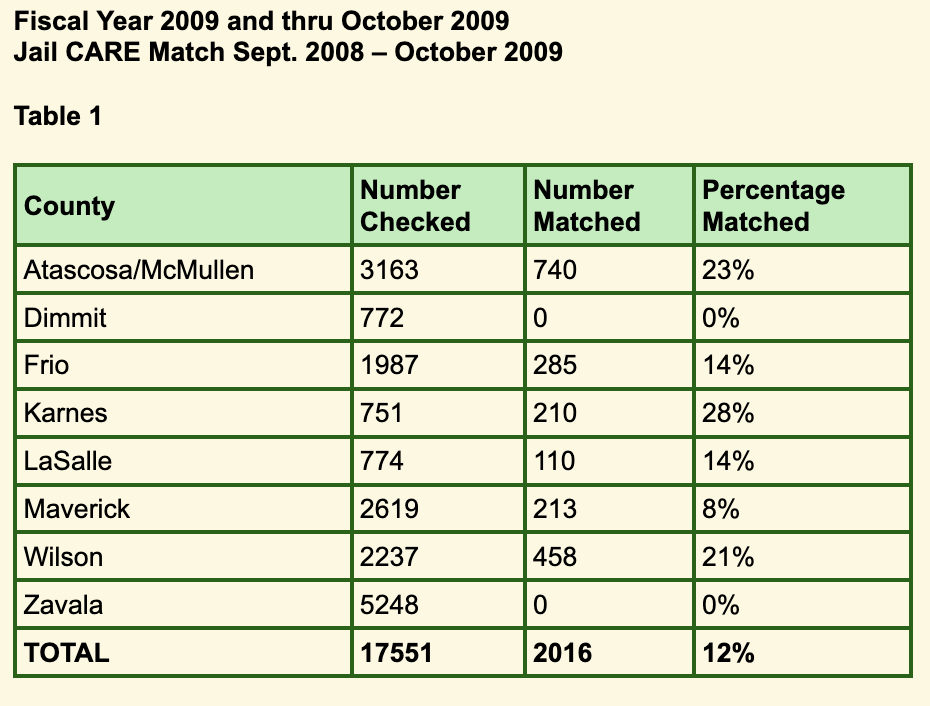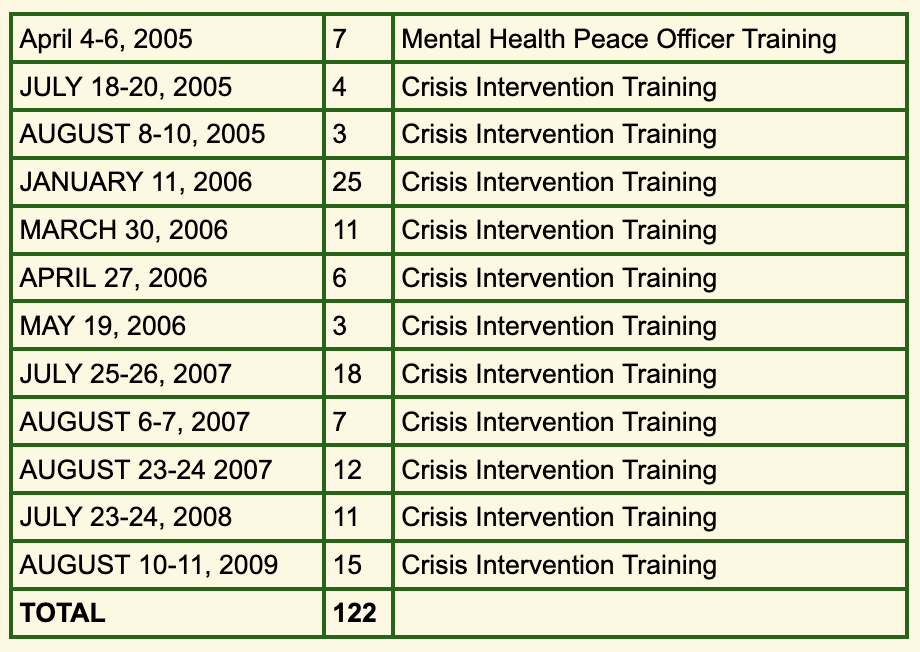During fiscal year 2010 the Mental Health Authority will offer training for law enforcement, the judicial system, hospitals and other stakeholders. The past trainings have been well received in terms of positive feedback from participants. Thus, the MHA will continue to coordinate a calendar of trainings in the area of mental health to increase opportunities for improving our relationships with law enforcement, educating law enforcement on jail diversion and available services, on accessing these services for detainees or other individuals they encounter who may possibly be experiencing symptoms of mental illness. The MHA will continue to report to the Board of Trustees the ongoing data related to TCOOMMI served consumers to further heighten awareness related to the numbers of persons with mental illness who are involved in the criminal justice system.
D. Process for receiving referrals from law-enforcement, juvenile probation & TYCCamino Real Community Services receives referrals from local jails and detention facilities when inmates or detainees request screenings, when jailers have concerns regarding an inmate's mental health, or when individuals indicate that they need their psychiatric medication or inform staff that they are present consumers of MHMR. Inmates are also identified by jail medical staff through their intake screening and referred for assessment through the intake & booking process as well as during the ongoing monitoring of prisoners or detainees. The agency employs a continuity of care worker who handles all referrals from the state mental health hospitals, TCOOMMI, and TYC to ensure these referred individuals are handled as a priority and linked to services in their local community. Currently, Camino Real is serving 110 adults and 24 juveniles who are identified as being on probation or parole through the criminal justice system. As previously mentioned, in FY09 this Center received 30 TDC referrals and 13 referrals from TYC. So far in FY10, Camino Real has received 2 referrals from TDC and 3 juvenile referrals from TCOOMMI.
A mental health screening process is implemented at all local jails where all persons arrested and booked into local jails are asked a series of questions from a specific questionnaire, which assists in the identification of mental health problems and possible mental health risks. Presently, referrals are received from the local law enforcement offices as well as juvenile detention offices that have access to the 24-Hour Telephone Crisis Hotline for emergency situations as well as through their direct contact with the local mental health sites to schedule routine intake services in a non-crisis situation. The local Juvenile Probation Offices continue to use the MAYSI to assess juveniles who are detained at their facilities and refer those juveniles if the assessment indicates a mental health problem to be present. All offices are familiar with the 24 hour Crisis Hotline and for crisis services a face-to-face crisis assessment is generally conducted at the local juvenile detention facilities or boot camp to minimize problems associated with transporting these youth. As part of the Juvenile Probation Plan the facility will implement a level of care needed to maintain the youth's safety; however, if the MHA recommends inpatient hospitalization immediate action is taken to get the youth into an inpatient psychiatric facility.
Routine intake services on the other hand are accessed through the normal process by contacting the local mental health site in their area. Local mental health authority staff holds meetings with adult and juvenile probation/parole departments as well as local sheriff's offices to update them on available services through the LMHA. In addition, local MHA staff has worked and will continue to work in conjunction with the local Sheriffs' Office to maintain the established process for cross-referencing detainee information against the state-wide database for MHMR (CARE System). The majority of sheriffs' offices are cooperating with the JAIL CARE Match requirement.
E. Process for diverting persons from Law EnforcementPre-booking and Post-booking StrategiesDiversion and treatment should be dependent on the severity of the offense and diagnosis. Camino Real Community Services will work with judges and local law enforcement officials to refer non-violent misdemeanor offenders who may have mental illness to assess whether the individual may need to be transferred to an inpatient facility because they pose a danger to self or others. Law enforcement officials will be asked to refer potential consumers to the local mental health clinic for routine intake services, medication related services, and/or case coordination. It is possible that Crisis Respite can be provided in lieu of incarceration and the person can be referred to the local residential facility that is available in the Camino Real MHMR service area. In addition, the center will work with Jail Administrators in identifying a safe cell that jails can place individuals during their wait for mental health intervention. The cell is separate from the general population and is secured as well as monitored. During the first half of FY09, from September 2008- April 2009 when statistics were available, Camino Real staff were called out to local jails to do face to face assessments on 51 inmates. Of those assessed, 20 were diverted to either state or private psychiatric hospitals.
Identification of Mental Health Services to be providedFor Incarcerated Individuals
- Coordinate Inpatient Hospitalization as needed
- Coordination Services
- Advocacy with the criminal justice system as appropriate
- Crisis Assessment Services
For Diverted offenders or offenders released from detention and/or Offenders on probation or parole. (Local Services to be provided based on eligibility and level of care recommended and authorized per the TRAG)
- Routine Intake
- Crisis and Assessment Services
- Case Management Services
- Rehabilitative Services
- Counseling
- Medication related services as medically necessary
- Advocacy with the criminal justice system as appropriate
- 24 Hour Crisis Services Hotline access
Post Booking Strategy for Violent Felony OffendersAs a Post Booking Strategy for violent felony/misdemeanor offenders with charges not dropped, an assessment can be provided to properly divert these individuals through a referral to the local clinic for treatment and stabilization of their symptoms and through the use of a safety plan enforced by the jail. When warranted, the center can facilitate a referral to a state mental health facility for acute inpatient treatment or for a Criminal Commitment.
Identification of CapacityCurrently Camino Real Community Services serves approximately 23 adult persons and 9 juveniles on a monthly basis who have been identified as having involvement with criminal justice. Though the center is at capacity we continue to serve offenders with mental illness through crisis intervention services in order to maximize the success of these individuals in securing proper treatment and remaining in the community. In addition this facilitates the center in maintaining a positive working relationship with our local jails and county officials.
F. Jail and Detention Diversion Planning and Evaluation CommitteeThe center has an established Jail Diversion Task Force Committee consisting of the following members:
County Judge or designee (Justice of the Peace) School Official or designee Chief Juvenile Probation Officer or designee Various County Sheriffs City Police Representatives from the Mental Health Authority Parent of a consumer District Judge Adult Probation Officer
The center will meet at least once per fiscal year for the purpose of planning, coordination of resources, information sharing and evaluation of strategies. The committee remains in agreement that there is a serious need to properly address the needs of the mentally ill persons who interface with law enforcement. The participating family member offers the group perspective that offers opportunities to build upon from an advocacy outlook. A consensus and general concern continues around the issue of training law enforcement so they are better prepared to work with persons with mental illness. This has been addressed with the provision of Agency sponsored trainings throughout the service area in FY2009 and previous years beginning in 2005 as well as the fact those 16 hours of training in Mental Health is required for many peace officers. In addition, other concerns include psychiatric evaluation services for purposes of assessing an inmate's competency to stand trial as well as concerns surrounding the transporting of inmates to the clinics for physician services.
Plan and Process for Ongoing CollaborationIt is the intent of Camino Real MHMR to hold Jail Diversion Action Committee meetings at least once each fiscal year. During FY2010 the following tasks will continue as goals:
Training of law enforcement, hospitals, schools, judicial staff and other stakeholders in the area of mental illness at least once a year. (ongoing goal) Provide at least 1 training on Mental Illness during FY2010 (ongoing goal) Committee to meet formally at least once by 8/31/2010 (ongoing goal)
In addition to this process it is essential to further develop a collaborative agreement between the criminal justice system and this local mental health authority to provide jail diversion services in a coordinated effort. Each participating agency would identify the roles and responsibilities of their agency in the process of working with individuals who are mentally ill. Presently, Camino Real MHMR is working on identifying and working with a local jail to arrange for Telemedicine Services by placing equipment, as provided by TCOOMMI, in the county so that our psychiatrist or other licensed personnel can provide assessment services to inmates who are identified as needing a mental health evaluation. It is anticipated this agreement will be in place by September 2010.
Resource Allocations Associated with Jail & Detention Diversion StrategiesCamino Real Community Services continues to work within the allocated General Revenue Resources to serve individuals involved with the criminal justice system. In addition the MHA engaged in a $39,786 one-year contract with TCOOMMI which will help cover costs for continuity services related to serving special needs offenders released to our local service areas. The crisis hotline at this time operates at a cost of $43,000 per year and is accessible to all communities including Criminal Justice Personnel. The local mental health authority (MHA) is committed to providing training to the various counties at no cost to the community using experts from this agency or other agencies with experience in mental health. The training provided fiscal year 2009 cost approximately $2400. In addition, the cost to continue holding Jail Diversion Action Planning meetings is approximately $1500 per year when considering the costs of the expenses for all stakeholders involved.


